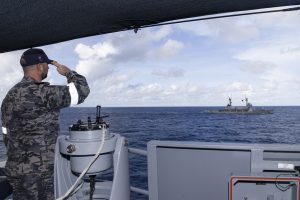In recent weeks ongoing tensions within the South China Sea have flared up. The contest over Second Thomas Shoal between the Philippines and China has led to Beijing sending more than 100 coast guard and other government-linked ships to the area to prevent the resupply of Philippine military personnel stationed on the Sierra Madre – a deliberately grounded ship that serves as an outpost on the shoal and a symbol of Philippine maritime claims.
Incidents like this are of grave concern to Australia. Canberra released a statement on December 12 “oppos[ing] destabilizing and coercive actions in the South China Sea” and “emphasiz[ing] the importance of all states being able to exercise rights and freedoms.” Australia and the Philippines recently conducted joint maritime patrols in Filipino waters.
These patrols came after the September 8 signing of an Australia-Philippines Strategic Partnership by Prime Minister Anthony Albanese and President Ferdinand Marcos Jr. in Manila. The prime minister stated that the agreement would “contribute to an open, stable and prosperous Indo-Pacific region.”
A month later, Australian Foreign Minister Penny Wong and Trade Minister Don Farrell hosted their Philippines counterparts at the Sixth Philippines-Australia Ministerial Meeting in Adelaide, with the joint statement “[a]cknowledging our identity as maritime nations” and “reaffirm[ing] the importance of maritime safety and security.”
Yet global maritime concerns are not confined to the South China Sea. While Chinese coast guard vessels were blasting water cannons at Philippine resupply ships, more than 7,000 kilometers away Houthi rebels in Yemen were firing missiles at commercial ships in the Red Sea. This led to a request from the United States that Australia deploy a RAN vessel to the Combined Maritime Forces, a multinational maritime partnership with a mandate of “countering illicit non-state actors on the high seas and promoting security, stability, and prosperity across… some of the world’s most important shipping lanes.”
This request raised concerns over whether Australia has enough ships to contribute, and calculations about what Australia’s most direct interests are. Defense Minister Richard Marles told journalists in Darwin that “the focus of our naval efforts right now is on our immediate region.” He added that the government was “looking at ways in which we can assert freedom of navigation within our immediate region, where our sea lines of communication are at their most acute, where we see most of our trade pass.”
Marles’ statement was an indication that Australia’s strategic priorities and limited resources are best invested in its neighborhood. Of these priorities, the South China Sea is clearly the most pressing concern. Yet maritime security within the region is not solely a naval or military consideration, and how Australia cooperates with Southeast Asian countries encompasses a range of issues including illegal fishing, piracy, terrorism, energy, trade, international law, irregular migration, biosecurity, climate change, telecommunications, transnational crime, and cybersecurity.
A recent paper from Asia-Pacific Development Diplomacy and Defense Dialogue (AP4D) highlights how Australia can effectively partner with its Southeast Asian neighbors to enhance regional security across these numerous concerns. And how this cooperation should be viewed as highly valuable in and of itself, rather than just solely through the lens of geostrategic competition.
Central to being able to enhance regional coordination on maritime security concerns is the development of a single point of contract system that would allow countries in the region to quickly identify and assess problems, incidents, and priorities and make the appropriate interventions. The complexity of region’s geography, as well as political realities, makes greater maritime awareness difficult, but also essential.
To facilitate this greater maritime awareness, Australia can build on its experience and reputation as a provider of military maritime capacity-building programs, extending training to both civilian and government officials. Alongside this, Australia’s provision of new technology and technical assistance can also be used as a pathway for greater defense cooperation.
The Australia Awards program is a mechanism already in place that can be utilized not just for technical training, but to develop strategic thinking. The scholarships and short courses offered are welcomed by the region and are in high demand. A “Women in Leadership in the Security Sector Short Term Award,” currently offered to Indonesian government agencies including Foreign Affairs, Marine Affairs and Fisheries, shares lessons and best practice between Australia and Indonesia. This could be extended out to the region.
While confrontations like those between the Philippines and China are of grave concern to regional stability, there are opportunities for Australia to play a more proactive role in coordinating a regional framework to address security concerns across numerous domains. This also comes with a recognition that many of elements of maritime security bleed into others – human security concerns arising from climate change being the prime example. A coordinated and cohesive approach from Australia and its neighbors is required to meet these challenges.
This article draws on the Asia-Pacific Development, Diplomacy & Defence Dialogue (AP4D) paper “What does it look like for Australia and Southeast Asia to develop a joint agenda for maritime security,” produced as part of the Blue Security program. AP4D thanks all those involved in consultations.

































